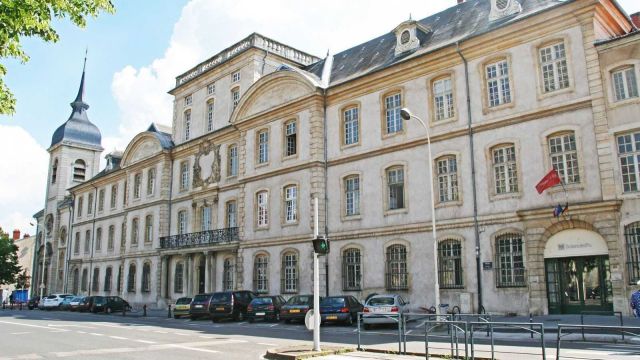Bocconi University vs. Sciences Po: Which varsity has better Social Sciences course
Bocconi University offers a range of scholarships to support both domestic and international students.
 For students aspiring to lead in these fields, Bocconi University in Milan and Sciences Po in Paris are two of Europe’s premier institutions. (Representative image/ Source: Sciences Po website)
For students aspiring to lead in these fields, Bocconi University in Milan and Sciences Po in Paris are two of Europe’s premier institutions. (Representative image/ Source: Sciences Po website)— Aditi Lahiri
Social sciences have a profound impact on global leadership and policymaking, with nearly 55 per cent of global leaders holding degrees in social sciences or humanities, according to recent statistics from the British Council. In a world grappling with complex challenges such as climate change, economic inequality, and global security, expertise in social sciences has never been more vital.
For students aspiring to lead in these fields, Bocconi University in Milan and Sciences Po in Paris are two of Europe’s premier institutions. With Bocconi’s interdisciplinary approach and Sciences Po’s legacy in political science and diplomacy, this comparison unpacks what makes each a standout choice for future change-makers.
Location
Located in the heart of Milan, Bocconi University offers students the chance to immerse themselves in one of Europe’s top business, financial, and cultural hubs. The university’s newly expanded campus showcases sustainable architecture, green spaces, and cutting-edge facilities open to the public. Milan is home to numerous multinational corporations, providing students with excellent opportunities to gain real-world experience. Beyond academics, Milan offers an abundance of recreational activities. Students can explore world-class art at the Pinacoteca di Brera, experience opera at the prestigious Teatro alla Scala, or indulge in the city’s renowned culinary delights.
In contrast, Sciences Po has campuses in seven French cities, with its main campus located in the heart of Paris, in the Saint-Germain-des-Prés district, near the Louvre Museum and Luxembourg Gardens. The Paris campus offers students proximity to key political institutions and international organisations, making it ideal for those studying social sciences, political science, and international relations. Beyond academics, Paris provides access to iconic landmarks such as Notre-Dame and cultural experiences at Opéra Garnier, enriching student life.
Course structure
Bocconi University offers a wide range of social sciences programmes focusing on economics, finance, management, legal studies, political science, and data and computer science. A distinctive feature of Bocconi’s social sciences department is its interdisciplinary approach. For example, the BSc in Economics and Management for Arts, Culture, and Communication blends business concepts with deeper insights into the arts, culture, and communication sectors. The programmes integrate economic, quantitative, and social science tools to ensure students develop a well-rounded perspective on global economic issues. Through engaging group projects, simulations, and case studies, students are equipped to tackle complex international challenges by bridging theory with real-world applications.
In contrast, Sciences Po offers a Bachelor of Arts in Social Sciences that focuses on six core disciplines: economics, law, history, political science, sociology, and humanities. In the first year, students explore each subject’s unique content and methods. In the second and third years, they engage in more multidisciplinary study while developing critical thinking and research skills. Students also gain international exposure through exchanges and can choose specialised areas of study to prepare for global challenges.
Admissions
The admissions process at Bocconi University is highly competitive; selection is based on two main criteria: the selection test score (55 per cent) and GPA from the third-last and second-last years of high school (45 per cent). Applicants must complete the Bocconi online test or submit scores from other standardized exams such as the SAT or ACT. Additionally, Bocconi values intellectual curiosity and motivation for the subject while considering these elements in their holistic review of each application.
Likewise, Sciences Po applicants are assessed based on academic excellence as well as motivation to study at the institution and their intellectual vision. The application process includes an interview that allows candidates to demonstrate their writing and thinking skills alongside their potential. This holistic approach enables candidates to showcase both their academic achievements and personal aspirations.
Scholarships
Bocconi University offers a range of scholarships to support both domestic and international students. These include merit-based awards such as the Bocconi Merit Awards — which can cover up to 100 per cent of tuition fees for exceptional students — and the Bocconi International Award available to international students that provides partial tuition fee coverage. For those needing financial assistance, need-based scholarships may cover full or partial tuition fees.
Similarly, Sciences Po offers several scholarships for domestic and international students including the Emile-Boutmy Scholarship which covers up to full tuition for high-achieving international students and the Undergraduate Scholarship programme that provides financial support based on need.
Extracurriculars
Bocconi University boasts more than 100 student associations covering a wide range of interests. These include initiatives like Bocconi Students Against Organized Crime — which raises awareness about crime-related issues — and Bocconi Students for ESG — focusing on environmental social governance topics. These societies provide students opportunities to engage in meaningful activities outside academics while promoting personal development, social responsibility, and leadership skills.
Likewise, Sciences Po offers a dynamic campus life with over 300 student clubs covering various topics like culture, environment, and solidarity. Students can participate in cultural activities such as concerts, exhibitions, theater performances, and creative workshops. Notable student-run organisations include Sciences Po Refugee Help and The Equal Society. These activities provide opportunities for personal growth as well as artistic expression and community involvement beyond academics.
For students aiming for a globally recognised social sciences education focused on political science or international relations with critical thinking skills necessary for careers in diplomacy or policy-making—Sciences Po stands out. In contrast, Bocconi University provides an interdisciplinary approach emphasising economics and business within its dynamic environment in Milan — ideal for those interested in integrating social sciences with real-world business applications.
(The writer is Senior Manager, Growth – Athena Education)
Photos



- 01
- 02
- 03
- 04
- 05




























